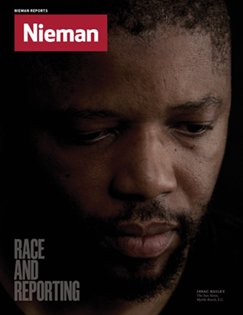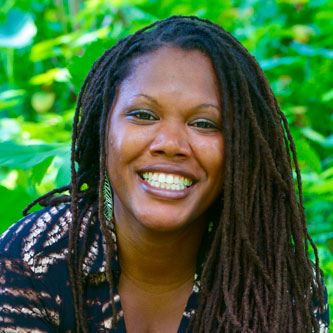As with any tribe, you can’t just say you’re part of the group. You have to be chosen. This is not immediately evident to anyone outside the tribe who wants in; at least, it wasn’t for me.
My writing journey has been leaning in the direction of journalism since my first summer job as a 14-year-old novice reporter at Hostos Community College in the Bronx. Growing up poor in one of the richest cities in the country gave me the tools for resourcefulness, sharp instincts and observation that an outsider needs in journalism to succeed. It helped me learn, too, that joining the journalism tribe required connections—the kind of network I didn’t have until I went to boarding school and college as a scholarship student. In these rarified, elite environments, I learned that more than skill, hard work or talent, above all, you needed the right network at the right time to get the “right kind of experience.” In other words, a member of the tribe had to vouch for you.
The late Dori J. Maynard championed diversity and instilled hope and confidence as a mentor
I was lucky enough to meet a few who saw my potential. They encouraged me to apply for a Hearst Newspapers Fellowship, a two-year program that involved four six-month stints at newspapers in large and mid-size newspaper metro markets. The value of the fellowship was that it extended my network, offered me invaluable reporting experience, and offered me a wide range of mentors.
Latoya Peterson, deputy editor for Fusion Voices, and I had a shared mentor, like so many others, in the late Dori J. Maynard, president of the Robert C. Maynard Institute for Journalism Education in Oakland, California. Dori not only championed diversity in order for journalism to truly reflect the fast-changing world in which we all now live, but she also gave back to the industry what the best mentors do: She instilled in us hope and confidence. Without Dori, Peterson says, “I would never have applied for a Knight Fellowship. I wouldn’t have even known they were available, much less that I could get someone to pay me $65,000 to think about the big thoughts on media.” Peterson’s time at Stanford University was also affirmation that the lack of a traditional background in journalism was irrelevant to her future.
The same was true for Nicole Collins Bronzan, director of communications at ProPublica. An internship provided the all-important connections that created a pathway for her to The New York Times. The opportunity and the pathway it afforded her into the business “is a classic example of outreach that matters not because it ‘lowers the bar’ in an effort to recruit minorities, but because it opens the eyes of smart, talented people to the fact that, yes, they can work their way to the best paper in the land—sometimes, even at age 23. A lot of us would never dare to set our sights so high,” she says.
The ultimate value of a group is that they remind each individual member of the group of their worth. The potential of journalists to continue that tradition by way of mentorship, internships, and fellowship programs may be the only opportunity we have to truly change the racial and gender diversity in our news organizations.
Read about strategies for creating inclusive newsrooms in our Race and Reporting cover package



